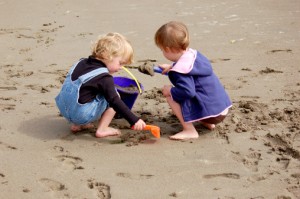Teaching Kids to Share
 Have you ever had the experience of being at the playground or on a playdate with your toddler or preschooler, and seeing your child in tears because another would not share? Another scenario is when your child is the one making someone else cry with his lack of sharing. These things happen to all parents, because children are not naturally inclined to share what they have. Young kids are egocentric and don’t consider the feelings of others; this is a completely normal stage that they’re going through, and it will get better. In the meantime, here are some tips on teaching kids to share:
Have you ever had the experience of being at the playground or on a playdate with your toddler or preschooler, and seeing your child in tears because another would not share? Another scenario is when your child is the one making someone else cry with his lack of sharing. These things happen to all parents, because children are not naturally inclined to share what they have. Young kids are egocentric and don’t consider the feelings of others; this is a completely normal stage that they’re going through, and it will get better. In the meantime, here are some tips on teaching kids to share:
-
Model sharing. You know that your kids are watching and imitating your every move, so be sure to model sharing for them. This goes much further than explanations and lectures, particularly for young children. Share with your little one: Give her a bite of your cookie, take turns playing with her toy car, let her play with your keys or cellphone, and let her see you share your refreshments with visitors. It might not have an immediate effect, but this will make a difference in the long run.
-
Encourage sharing from a young age. As soon as your toddler has the capacity to yank something out of another child’s hands, it’s time for you to step in and give gentle reminders. Tell your child to give the toy or other item back, and say that he can have a turn in a few minutes. Try to avoid wrestling the object of desire out of his hands, though; that’s definitely not the behavior you want him to imitate, after all!
-
Make sharing easier by setting some boundaries. After all, you don’t share everything you own with anyone who happens to stop over. If you’re expecting company, let your child choose a few favorite belongings to place out of reach. She may happily share her blocks and figurines if she knows that her lovey and special dolls aren’t anywhere where her guest can touch them. If she’s too young to choose something to put aside, then you do it for her: If you have a toy that other kids tend to gravitate toward, prompting a tantrum in your own child, then simply put it in your bedroom and close the door.
-
Be fair. Don’t insist that he share his truck with any kid on the playground who wants to play with it. If it’s a child that your own child doesn’t know, then it’s perfectly reasonable for you to step in and say, “He doesn’t want to share that right now.” If a scene develops, be prepared to stow the treasured item in your car. In general, kids should share communal property with everyone, and toys with kids they already know. It’s nice to share with strangers, but if it’s a toy that only one child can play with, then it’s not really necessary. If these situations come up regularly, then it’s probably a better idea to bring sidewalk chalk or several balls instead of one toy that is hard to share.
-
Be realistic. Little ones aren’t going to share perfectly every time. There will be tantrums, snatching items out of a playmate’s hands and other social faux pas. Just smooth things over the best that you can, without favoring either child, if possible, and know that it will get better as he gets older.
Sharing is just one of those social behaviors that all children need to learn. Most are good at sharing by the time they start kindergarten, if not before. Do you have any tips to pass along on teaching kids to share?








